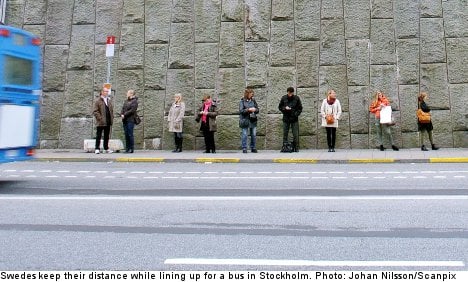Swedish people are often said to be cold, just like the climate. And while that may or may not be true, one of the very first things I noticed here was that people just didn't do small-talk. Not even micro-talk. In fact, there was no talk. There was silence.
By small talk, I mean the “Hello” you might offer up to the old man standing next to you at the bus stop, or the “Nice weekend?” you might ask Sven from sales as you pass in the hallway.
The kind of thing that can develop from small talk to medium talk, if the occasion permits. The kind of medium talk that can grow into biggish talk and even, dare I say it, a blossoming friendship.
Swedes are very aware of this, and seem to have varying opinions on it.
“Of course I've noticed it, I find it extremely strange,” a middle-aged man from central Sweden told me recently. “A lot of our neighbours say hi as they walk past, but only because they feel obliged to. You can tell it's forced. In England it's a whole different story, they seem to really want to chat.”
Another Swede, a young woman from Stockholm, disagreed.
“Why would I want to say hello to someone I don’t know? It's fake and useless. Tell me one thing that can be gained from saying hi to the guy checking my train ticket and I'll start talking immediately.”
And it's not just a Stockholm thing, either; I've seen and heard the same thing elsewhere. Personally, I love a little hello, and I wonder if the Swedes are missing out on something here. But is it because they're lacking social skills or have they rather efficiently cut out the chit-chat that many English-speakers thrive on?
You see, back home in Australia people treat strangers like neighbours, and I've noticed a similar trend as I've travelled around the world. I've had more meaningful conversations with London bus drivers than with my Stockholm neighbours, though not for lack of trying.
I've been ignored countless times when saying hej to neighbours, shopkeepers, even waiters who you think would at least act friendly in the hope of a tip. I even experimented with the cutesy little hej, hej hoping it could be a friendlier greeting. And while I got the very occasional hej back, it more often than not came with a faint look of irritation and a dash of mistrust.
And it's not just me who's noticed, even visitors to Sweden have noticed the silence as one family discovered in 2011.
But why?
I turned to an expert, UK native and Communications Coach Allie Edwardsson, who has called Sweden home for over 25 years.
“Swedes can absolutely do small talk, but the problem is they don't value it. They don't like it, it’s an attitude thing,” she explained.
“And because it's not seen as a valuable skill, no one cares to actually do it. Swedes are very serious, and talking about the weather seems frivolous to them. While I love Sweden, especially Stockholm, I really do miss the small talk from back home.”
I got a similar response from a Swedish expert too, Magdalena Ribbing, who has penned 15 books on etiquette and writes a regular column for the Dagens Nyheter newspaper on the subject.
“Pleasantries are not a Swedish speciality,” she told me when I asked her if Swedes are, perhaps, more polite when speaking English.
“This is a vast country, and people have not been talking to one another for a long time. In Britain, where a much bigger population lives in a much smaller place, the English are simply forced to talk more, and a certain politeness has naturally developed.”
So there you have it, confirmed by two experts: Swedes don’t do small talk. But you know who does? All the immigrants, including me.
The best Swedish conversations I've had were with the Thai lady at our nearby Chinese restaurant, the Serbian man at our pizza place, the Turkish guy in the bakery. A Swedish friend told me it's because foreigners understand hospitality unlike their northern cousins in Sweden, but Edwardsson, however, puts it all down to culture.
“Foreigners in Sweden are great at small talk, it's in their culture. They just value that kind of thing much more than Swedish people do,” she said.
But as pleasant as these foreigner friends are, it's still not enough. Not for me, anyway. I want the Swedes to enjoy what they're missing out on. I'm not giving up my attempts at small talk. Who knows, maybe I can change Sweden and start a revolution.
One hej at a time.
Oliver Gee



 Please whitelist us to continue reading.
Please whitelist us to continue reading.
Member comments